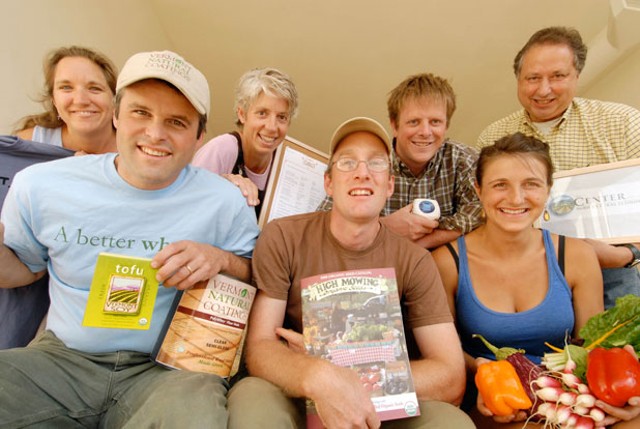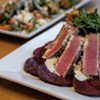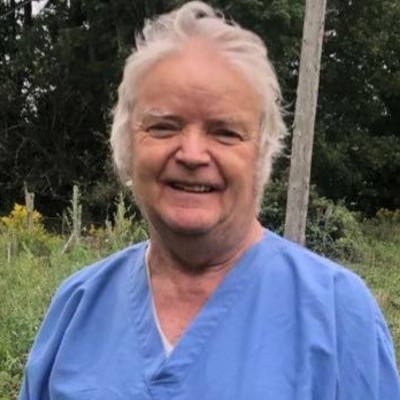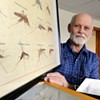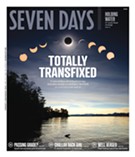Published September 3, 2008 at 5:04 a.m.
There's one in every rural county: a town that's the butt of jokes for its purportedly extra-rustic inhabitants. The punchlines may involve guys who have more rusted-out cars than teeth. In the Northeast Kingdom, that town has been Hardwick. Case in point: During the 2002 Olympics, a joke circulated on the web about a guy from Hardwick who tried to sneak into the games by saying he was a fencer. As evidence, he presented a roll of barbed-wire fencing.
Once known as the "Building Granite Center of the World," the settlement of just more than 3000 souls has long suffered from economic depression and a dearth of meaningful employment. In 2005, Hardwick weathered another blow: A fire devastated the Bemis Block, a historic building on Main Street, leaving a burned-out shell.
But nowadays, a first-time visitor might not catch even a whiff of the town's troubled past. Where the charred building once stood is a casual, upscale eatery called Claire's Restaurant and Bar (see this week's ""Taste Test"). Just down the street, the Buffalo Mountain Food Co-op and Café offers an alternative to the nearby Grand Union. Not far away, the Vermont Milk Company and Vermont Soy churn out yogurt, ice cream and cheese, and organic tofu and soymilk, respectively.
Motorists passing through town on a Friday will notice bakers, farmers and citizens converging on the happening Hardwick Farmers' Market. Other parts of town boast a new community garden, established in 2006, and the North Hardwick Dairy, which has been awarded the state's "Highest Quality Milk Award" for four years running.
How did a once washed-up town become a vibrant agricultural hub? A region's changing fortunes may be too complex to grasp completely - or to express in soundbites. But to comprehend the renaissance of the greater Hardwick area, the best place to start is with the members of a nonprofit called the Center for an Agricultural Economy.
The group's board is composed of successful ag business owners from Hardwick, Greensboro, Craftsbury, Wolcott and East Johnson. With a firm focus on profitability, they defy the old stereotype that working the land is a hardscrabble business reserved for those who embrace a bare-bones existence.
While some critics - who prefer to remain anonymous - suggest that some of these ag enterprises have expanded beyond their bounds, their owners contend that responsible growth is key to feeding the county - and beyond - and beefing up the job market. Hence they formed the Center, whose aim is to promote a rural economy that links growers, manufacturers and consumers in a mutually supportive web. To this end, the Center just purchased Atkins Field, a 15-acre tract in downtown Hardwick, which will eventually be the site of a year-round farmers' market and an agricultural education center à la Burlington's Intervale.
The Center is the brainchild of Andrew Meyer, co-owner of Vermont Soy and Vermont Natural Coatings - a business that turns leftover whey from dairy operations into an environmentally friendly wood finish. Meyer is a bona fide local who grew up on a conventional dairy farm in Hardwick. Today, his family owns the organic, innovative North Hardwick Dairy, which is primarily run by his brothers, Nick and Taylor. They recently installed a wind turbine to offset some of the farm's electrical needs, and also began converting used fryer oil into biodiesel to power their farm equipment. Some of the family's acreage is used to grow soy for Andrew's bean-based venture.
Meyer spent a decade in Washington, D.C., as an ag policy advisor for Senator James Jeffords, and the experience convinced him Vermont needed a new model. "I came to realize that federal policy is really based around commodity ag," he says. "I realized, if Vermont is going to have a future in ag, it had to come up with its own system, not based around a commodity market . . . food can become the economic driver and basis for a community economy."
Why did he base the group in Hardwick? Home-town loyalties aside, Meyer believes the place has the right blend of farming history, pristine land and residents with a solid work ethic.
Not all the Center's board members are natives of the region, but all have created models of environmentally focused, sustainable business. For example, board member Warren Rankin, of Top Rankin dairy farm in East Johnson, was "an organic farmer before organic was organic," Meyer explains. "He's been [a successful dairy farmer] with no conventional components to his farm. When we look at him, we have great confidence this can be done."
Meyer describes the board collectively as "entrepreneurs who are truly invested in . . . how [their] businesses can interact and build a healthy food system and a healthy economy. They find great benefit in sharing resources and seeing their colleagues do well."
That's even the case for members who might be traditionally construed as competitors. For example, board member Neil Urie of Bonnieview Farm and Vice-President Andy Kehler of Jasper Hill Farm both make and sell artisan cheese. But this crew has no room for cutthroat tactics and rivalry; one of the Center's guiding principles is that healthy businesses beget other healthy businesses.
In fact, Andy Kehler and his brother Mateo - who makes and ages Jasper Hill's award-winning cheeses - have been hard at work on a piece of infrastructure they hope will boost Vermont's whole artisan cheese industry. Their newly constructed cellar, which looks like a concrete fallout shelter built into the side of a scenic hill, is designed to hold up to 2 million pounds of artisan cheese.
With a herd of only about 50 dairy cows, the Kehlers don't have enough product to fill the cellar by themselves. Their goal is to pack the seven vaults - each of which is optimized to store a different style of cheese, from tangy cheddars to stinky, washed-rind wheels - with other producers' wares. Once the cheeses have reached their peak, the Jasper Hill group will package them, slap on the original producer's label, and ship them to fine dining establishments and specialty restaurants nationwide.
Some small dairy owners have accused the Kehler brothers of empire building and using other people's cheeses to increase their fame, but Mateo doesn't see it that way. "We're taking the most labor-intensive bits of the process . . . off the table," he explains. Most small cheesemakers "are scraping by" on their earnings. By providing a "bundle of services" - aging, packaging, marketing and distribution - Jasper Hill gives these producers money up front and frees them to focus on caring for their herds and producing a quality product.
The results are speaking for themselves. Cabot Clothbound Cheddar, aged at Jasper Hill, was picked as "Best in Show" from among more than 900 selections at the 2006 American Cheese Society competition. Wine Spectator's recent list of the top 100 cheeses in the world features two of Jasper Hill's own, as well as several others that are being aged in the farm's cellar.
Another successful member of the Center's board, Treasurer Pete Johnson of Pete's Greens in Craftsbury, has been an area resident since the age of 12. Johnson began his farming efforts with a half-acre of his parents' land, a few hand tools and no money. Now he tills and plants a 35-acre swath and sells his clean and colorful organic vegetables to food co-ops and restaurants across the state. Pete's Greens also offers a year-round Community Supported Agriculture (CSA) program that supplies its many participants with heirloom vegetables and localvore products such as sunflower oil, bread, miso, cornmeal and cider vinegar.
With innovative approaches to season extension and a new kitchen on his farm that is certified for aspects of food preparation - from baking to preparing soup stock to stuffing sausages - Johnson is revolutionizing the way Vermonters eat, particularly in the cold months. Despite these innovations, or perhaps because of them, he gets a bit of flak for distributing his farm shares as far away as the Burlington area - and thus competing for CSA dollars with "more local" Chittenden County farmers.
But Johnson rejects the idea that farmers are somehow less "pure" once their businesses get big enough to provide them with a decent living. "We never had any particular growth goal," he says. "But we just saw needs and tried to fill them. I am motivated by the desire to feed people, but profitability is a part of that, so we can do more cool things and feed even more people."
With gas and food prices rising, Johnson thinks local sourcing of produce "has to happen faster than it is." Moreover, "We need all types and all scales, from the smallest patio home garden to the largest acreage anyone dares to use for vegetables."
Nostalgia about traditional small holdings aside, Johnson suggests that "certain things . . . work better on a little bit larger scale. You can better afford the type of facilities you need for storage. You can be a depot of sorts, where food comes in and goes out. You shouldn't underestimate the environmental cost of a lot of different people driving around food."
When it comes to improving the Earth, literally, few are making a bigger impact than Center board member Tom Gilbert of the Highfields Institute, a nonprofit composting operation that works to provide expertise and solutions to area farmers, schools and businesses. A consultant for several Vermont waste-management groups, Gilbert helped the embattled Vermont Compost Company in Montpelier troubleshoot problems that were threatening to shut it down. "[Gilbert] has an unbelievable approach to the dynamics of composting," Vermont Soy's Meyer exclaims, noting that scraps from his factory and Claire's Restaurant go to Highfields to be composted.
Some of that compost finds its way onto the fields of High Mowing, one of the country's most respected organic seed companies. High Mowing founder/owner Tom Stearns is the final piece of the Center's puzzle. Acclaimed for his focus and energy level, Stearns is the nonprofit's acting president. He's been known to help take reservations at Claire's, give tours of Pete's Greens, and explain the intricate workings of the Jasper Hill cellars.
Like Pete's Greens, the result of Johnson's youthful affinity for building greenhouses, Stearns' business grew out of a hobby. In 1995, he began saving the seeds from his garden. "I was interested in having as self-sufficient a home garden as I possibly could," he recalls. After moving to Vermont, he realized he had more seeds than he could use, so he put together a miniature catalogue. In 2000, Stearns quit his day job to focus on his seeds full-time, and in 2005, decided to take the business national; with the economy in a slump and more people aiming to grow their own food, the move is paying off. "There's a lot of people gardening who weren't before," Stearns suggests.
High Mowing is growing while traditional companies struggle - and indeed, Stearns says, tough times aren't negatively affecting any of the businesses represented on the Center for an Agricultural Economy's board. Why? "The price of oil just reinforces everything that all of us do," he explains. "It has actually leveled the playing field for those of us who are choosing methods that don't pollute."
As the prices of conventional products approach those of sustainable ones, Stearns guesses, more Americans are paying attention to how the goods they purchase are produced. "More people are realizing that buying directly from producers and supporting small businesses and choosing local and organic food is a better bet," he says.
And so is Hardwick. With Claire's Restaurant and Bar attracting foodies, the Jasper Hill Cellar celebrating its grand opening, mega-chain Whole Foods carrying Vermont Soy products and the Center acquiring Atkins Field, the region's cred looks likely to grow. In a few years, if all goes well, eager ag entrepreneurs will travel to the greater Hardwick area to learn from its model of interlinking, sustainable businesses.
Note to residents of Caledonia County: It's time for some other town to be the butt of bumpkin jokes. Hardwick is on its way up.
More By This Author
Speaking of...
-

Q&A: Howard Fisher Delivers Meals on Wheels With a Side of Good Cheer
Dec 20, 2023 -

Video: Howard Fisher Delivers Meals on Wheels
Dec 14, 2023 -

Q&A: Alexis Dexter Rescued 57 Shelter Cats During the July Flood
Sep 13, 2023 -

Peruvian Cacao Comes to Hardwick With Prophecy Chocolate
Sep 12, 2023 -

Video: Two Months After the Flood, Alexis Dexter Rebuilds Kitty Korner Café in Barre and Continues to Rescue Cats
Sep 7, 2023 - More »
Comments
Comments are closed.
From 2014-2020, Seven Days allowed readers to comment on all stories posted on our website. While we've appreciated the suggestions and insights, right now Seven Days is prioritizing our core mission — producing high-quality, responsible local journalism — over moderating online debates between readers.
To criticize, correct or praise our reporting, please send us a letter to the editor or send us a tip. We’ll check it out and report the results.
Online comments may return when we have better tech tools for managing them. Thanks for reading.


































